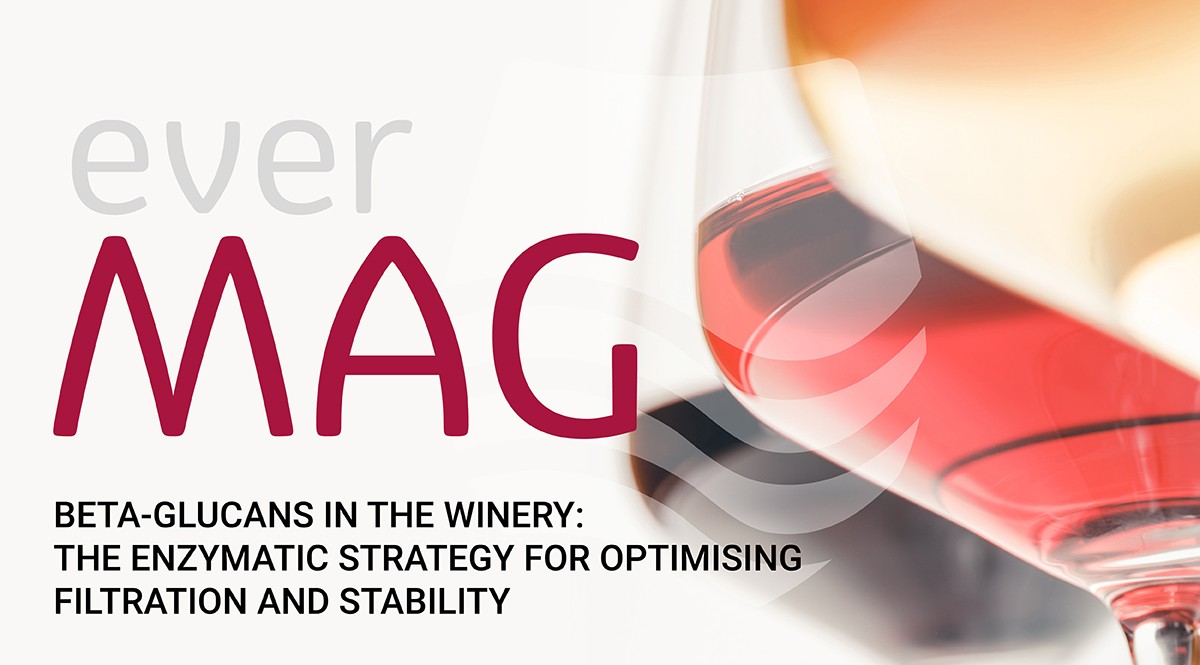Beta-glucans under control: enzymes for more stable wines.
In the winery, the presence of beta-glucans can quickly become an operational obstacle: overly viscous musts, slow filtration and endless ageing.
The targeted use of β-glucanase enzymes allows these problems to be tackled effectively, improving the quality and management of wines from the early stages of vinification.
Beta-glucans in oenology: main causes
Beta-glucans are polysaccharides that can compromise the filtration and clarification of wine. The two main causes of their presence in must and wine are:
- Botrytis cinerea: the “grey mould” which, in wet years, infects the grapes and releases large quantities of high molecular weight beta-glucans.
- Yeasts: at the end of fermentation, during autolysis, the cell walls of yeasts also release beta-glucans, although in smaller quantities than Botrytis.
In both cases, the concentration of beta-glucans can make work in the winery more complex, especially during the filtration and ageing stages.
Problems caused by beta-glucans in wine
- Increased viscosity: β-glucans significantly increase the viscosity of must and wine, giving it an almost syrupy consistency in severe cases.
- Difficulties in clarification and filtration: acting as protective colloids, beta-glucans envelop suspended particles, preventing them from settling. This makes clarification, racking and, above all, filtration extremely slow, difficult and costly, as the filter materials quickly become clogged.
Enzymatic solution for wine filtration
The addition of an enzyme preparation based on β-glucanase allows the long chains of beta-glucans to be hydrolysed, i.e. broken down,
into simpler, more soluble molecules.
The result is a significant improvement in clarification, filterability and refinement,
with tangible benefits for the winemaker.
✅ Key benefits:
Improved filtration and clarification
- Faster racking: the must clears more quickly.
- More effective clarification: enological adjuvants (bentonite, gelatines, etc.) work more efficiently.
- Easier filtration: higher yield and speed, less filter clogging and reduced operating costs.
Ageing on noble lees (Sur Lie)
- Accelerated yeast lysis: the enzyme breaks down cell walls more quickly.
- Release of mannoproteins: this results in a smoother, rounder wine with greater volume in the mouth, improved tartaric stability and a more persistent aromatic freshness.
This approach is particularly effective for white wines and high-quality sparkling wine bases, but also offers benefits for structured red wines.
The data represent typical results achievable with highly effective enzyme preparations such as EVERZYM SUR LIES.

🧬 Everzym Sur Lies: the polyvalent enzyme for beta-glucan management
Everzym Sur Lies is a complex liquid enzyme solution developed by Ever to address multiple winemaking issues, optimising wine production even under difficult conditions (e.g. botrytised grapes).
⚡ Main enzymatic activities:
- β-Glucanase: effectively breaks down beta-glucans produced by Botrytis and yeasts.
- Pectolytic: improves clarification and filtration by degrading pectins.
- Protease: reduces foaming and contributes to protein stability, with a possible reduction in the use of bentonite.
- β-Glicosidase: releases aromatic precursors (terpenes, norisoprenoids), increasing the complexity of the olfactory profile.
In brief, it is not just a simple enzyme, but a veritable “cocktail” of complementary activities working synergistically.
Benefits of using Everzym Sur Lies
1. To optimise ageing sur lies
Everzym Sur Lies accelerates yeast autolysis and the release of mannoproteins in a short time, achieving results in a few weeks that would normally take months.

2. To improve clarification and filtration
Particularly useful for wines made from botrytised grapes: speeds up operations, reduces clogging and processing times.

3. To increase aromatic complexity
β-glycosidase activity enhances varietal notes, making the aromatic profile more intense and complex.

4. To improve wine stability
The increase in mannoproteins and protein degradation promote greater tartaric and protein stability over time.
Conclusions
Beta-glucan management is a crucial technical step in optimising wine filtration, sur lies ageing and final sensory quality.
Everzym Sur Lies is an advanced oenological tool capable of accelerating and intensifying natural processes while solving practical problems in the cellar.
It is the ideal choice for oenologists and technicians who want to improve the structure, complexity and stability of their wines.

 IT
IT